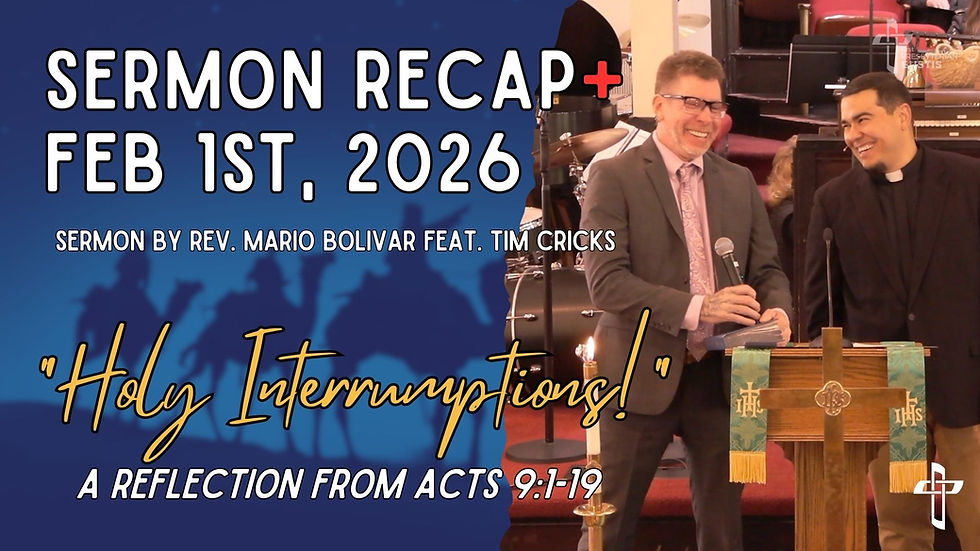Sermon Recap+ June 8, 2025
- Mario Bolivar
- Jun 10, 2025
- 3 min read
Updated: Jun 12, 2025
The Miracle of Pentecost: Understanding the Holy Spirit's Presence in Our Lives
Pentecost isn't about the birth of the Holy Spirit but rather our awareness of the Spirit's presence. The Holy Spirit has been with us from the beginning of creation and continues to be with us today. But what exactly happened at Pentecost, and what does it mean for believers today?
What is the True Miracle of Pentecost?
When reading Acts 2:1-13, we might assume the miracle was that the disciples suddenly spoke in different languages. While that was indeed miraculous, it wasn't the greatest miracle of the story.
Some might suggest the miracle was that everyone was speaking about God's great deeds of power (Acts 2:11). Imagine everyone speaking simultaneously, yet everyone understanding what was being said—that would be extraordinary!
However, the true miracle is found in Acts 2:4: "All of them were filled with the Holy Spirit." This miracle continues to happen today. Every believer is filled with the Holy Spirit—not because of our goodness or worthiness, but because of God's mercy and providence.
How Does the Holy Spirit Manifest in Believers?
The presence of the Holy Spirit in our lives is represented in two ways:
Gifts of the Holy Spirit
In 1 Corinthians 12:7, we read: "To each is given the manifestation of the Spirit for the common good." God has equipped each of us with specific gifts—not for our personal benefit or privilege, but for the benefit of the community of God.
These gifts include:
Wisdom
Knowledge
Faith
Healing
Working of miracles
Prophecy
Discernment of spirits
Speaking in tongues
Interpretation of tongues
All these gifts are "activated by one and the same Spirit who allots to each one individually, just as the Spirit chooses" (1 Corinthians 12:11). The key word here is "activated"—you might receive a gift, but it's only activated as you use it for the common good.
Fruits of the Holy Spirit
While gifts are directly given by God for the common good, fruits are the evidence of God's presence in our lives. If you want to measure the presence of the Spirit, pay attention to these...
According to Galatians 5:22-23, the fruits of the Spirit are:
Love (not just a feeling, but an action)
Joy (choosing to abide in God's presence despite circumstances)
Peace (beyond the absence of conflict)
Patience
Kindness (not just niceness)
Generosity (giving to those who cannot repay)
Faithfulness
Gentleness
Self-control
What Can We Learn from Biblical Examples of the Spirit's Work?
The story of Saul and David in 1 Samuel 16 provides a powerful contrast in how people respond to God's Spirit.
Saul was chosen by God—tall and handsome (1 Samuel 9:2). But God eventually rejected him because Saul began to think he was in control rather than serving God. When confronted with his wrongdoing, Saul made excuses instead of repenting.
David, on the other hand, wasn't even initially considered when Samuel came to anoint one of Jesse's sons. God told Samuel, "Do not look on his appearance or on the height of his stature" (1 Samuel 16:7). Though David also committed serious sins, when confronted by the prophet Nathan, he repented sincerely.
Both were anointed by God, but only one truly surrendered to God's will. The Bible teaches us not to listen to our hearts, which can deceive us, but to listen to Jesus and repent when we fail.
Why Does This Matter for Believers Today?
God doesn't require perfection from us. He requires surrender to His will and power. All believers have received gifts from the Holy Spirit—the same Spirit that empowered the disciples at Pentecost. We have the same power as the apostles. Like Peter, we can walk on water, but we'll also sink if we take our eyes off Jesus.
Life Application
The message of Pentecost challenges us to recognize and activate the gifts God has given us for the common good. Here are some questions to reflect on this week:
What gifts has the Holy Spirit given me, and am I using them for the common good or for my own benefit?
Can I identify the fruits of the Spirit in my life? Which ones are evident, and which ones need more development?
When I make mistakes, do I respond like Saul (making excuses) or like David (repenting sincerely)?
Am I trying to control my life, or am I surrendering to God's will and power?
This week, pray for God to reveal your spiritual gifts and to activate them for the common good. Pay attention to the fruits of the Spirit in your life as evidence of God's presence. Remember that God has given you these gifts not because you've earned them, but because of His generosity and love for you and for the community of believers.





Comments